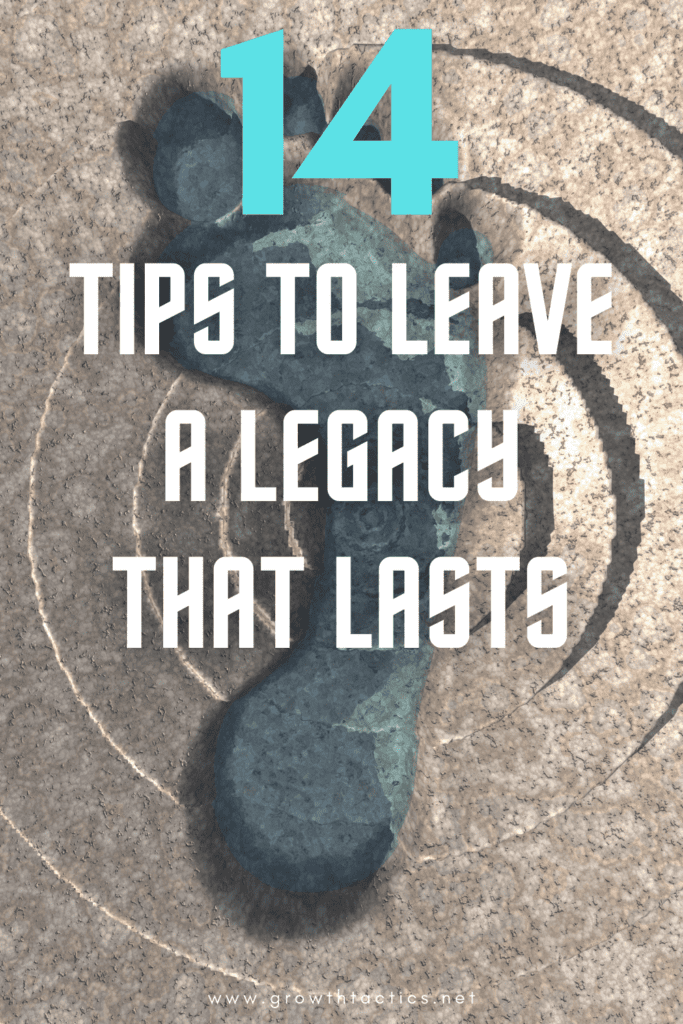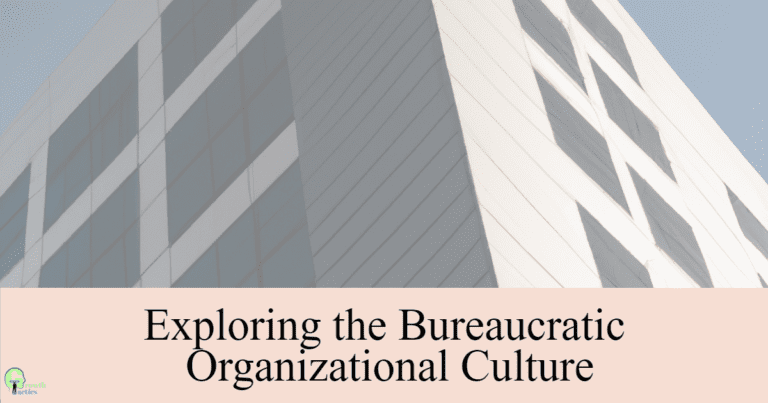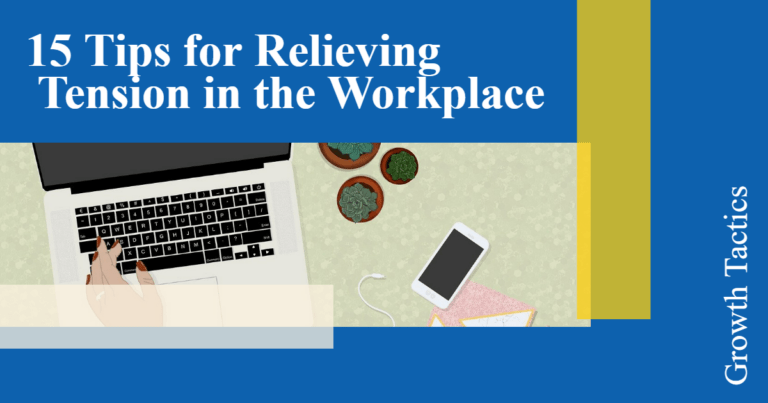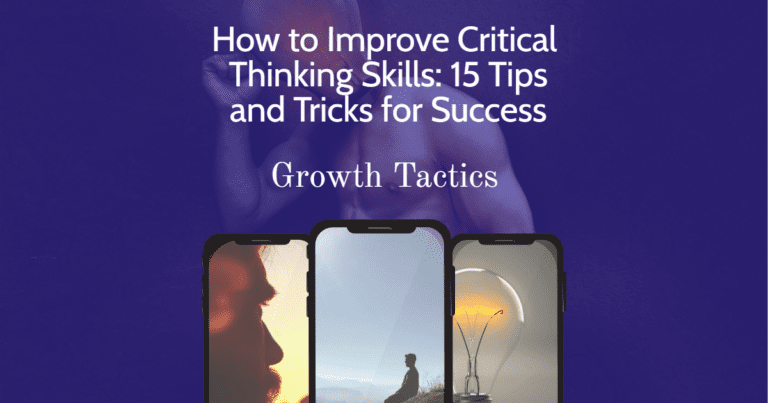What legacy do you want to leave behind at work and in life? No one lasts forever and all that is left when we leave is our lasting legacy. What are you going to leave for the people that you have influence over and care for? In this article, you will discover 14 new ways to leave a legacy.
In a study conducted on data from Experian, 73% of Americans who passed away in 2016 had over $60K in debt. Luckily your legacy is not only about leaving money. Don’t get me wrong it’s great to leave some money behind for your loved ones. But that’s far from the only thing you leave behind.
Jump To Section
Definition of Legacy
What is a legacy? A legacy is what you leave behind when you are not there. It doesn’t always mean gone from this earth. It might mean when you move on from the position you currently work in. Maybe it means when your children get old enough to move out on their own. Family legacy is important like career legacy.
We all leave our mark on others and the organizations we cross paths with. The question is how positive is your legacy going to be? How many people’s lives are you going to make better for coming in contact with you? Follow these tips to leave a lasting legacy for others.
How to Leave a Legacy – Build Your Legacy Starting Now

Tip #1: Walk the Talk
“Words do less than 10 things, but actions do more than 10 thousand things. Leaders don’t talk in vain; they follow with actions.”
– Israelmore Ayivor
Nobody likes a hypocrite. Do the things that you say you’re going to do. The most respectable people are the ones that say “Do as I say because I’ll be right there doing it with you.”
I can’t tell you how many times I’ve done something that many believe is below my pay grade. Typically, someone who works for me offers to take over out of respect. I rarely let them because I’m not too good to do anything that I would expect them to do.
Always promote a positive professional image. To learn how to build a positive professional image check out this article.
Tip #2: It’s a Marathon Not a Sprint
Building a legacy is not a one-time event that can be accomplished quickly or easily. It’s a long-term process that requires a significant amount of time, effort, and dedication. To build a lasting legacy, you must be patient and persistent in your efforts. It takes time to establish a reputation and a body of work that will be remembered for generations to come.
Rushing the process of building a legacy can hurt it. It’s important to take the time to carefully plan and execute your vision and to make sure that your actions align with your values and goals. Acting impulsively or without careful consideration can lead to mistakes that could tarnish your reputation and diminish the impact of your legacy.
If you want to learn how to build a legacy, it’s important to understand that it’s something that you build up over your entire lifetime. Every action and decision that you make contributes to your legacy, whether positive or negative. Therefore, it’s important to be intentional about your actions and to create a plan that aligns with your values and goals.
By consistently working towards your vision and taking small steps each day, you can gradually build a legacy that will be remembered for generations to come. It’s important to stay focused on your goals, seek out opportunities to learn and grow, and surround yourself with people who support and encourage your efforts. With dedication and perseverance, you can leave a lasting legacy that will make a positive impact on the world.
Tip #3: Add Value to Those Around You
“Not adding value is the same as taking it away.”
– Seth Godin
Adding value to those around you is a powerful way to leave a lasting legacy. By helping others achieve their goals, you can make a positive impact on their lives. Creating a ripple effect that can extend far beyond your lifetime.
The concept of adding value to others is simple, yet many people overlook it. It involves taking the time to understand the needs and aspirations of those around you and then using your skills, knowledge, and resources to help them achieve their goals. It could be as simple as providing guidance or advice, offering support and encouragement, or connecting them with people or resources that can help them succeed.
By helping others achieve their goals, you not only make a difference in their lives, but you also create a legacy of generosity and kindness that will be remembered long after you’re gone. Your actions can inspire others to pay it forward and continue the cycle of adding value to those around them.
There is no better way to leave a legacy than by helping others succeed in their careers and life. When you help others achieve their goals, you create a legacy that is built on the success and accomplishments of others. This legacy is not about what you have achieved, but about the positive impact you have made on the lives of others.
Tip #4: Add Value to the Place You Work For a Powerful Legacy
Adding value to your workplace is a great way to not only boost your career prospects but also to leave a lasting legacy. It’s important to understand that your value to your employer is directly tied to your ability to make a positive impact on the company’s bottom line. Therefore, it’s crucial to look for ways to add value to your employer by identifying and addressing their needs.
One of the most effective ways to add value to your workplace is by identifying areas where you can improve efficiency or productivity. This could involve streamlining processes, developing new systems or tools, or finding ways to cut costs. By doing so, you can help your employer save time and money, which will increase your value to the company.
Another way to add value to your workplace is by developing new skills or expertise that are relevant to your employer’s needs. This could involve taking courses or workshops to learn new software, programming languages, or other technical skills. By doing so, you can position yourself as a valuable asset to your employer, which will increase your chances of being promoted or given more responsibilities.
When you add value to your employer, they will likely do more to keep you. This could include offering you more opportunities for career development, providing you with better benefits or compensation, or giving you more autonomy in your work. By demonstrating your value to your employer, you can establish yourself as an essential member of the team, which will make it more difficult for them to let you go.
Tip #5: Know Your Mission and Vision

What are your mission and vision? What are you trying to achieve, and how do you want the future to be? Answer these questions to yourself. Your mission and vision guide you in all that you do. Let others in on your mission and vision. If others believe in your mission and vision they will do what they can to help you achieve it. With a good mission and vision, people will continue to pursue their goals. Even if you are not around continuing and building on your legacy.
A great way to understand your vision is with a vision statement. Learn to make a vision statement that inspires and motivates others in this article. Click to learn how to easily create a vision board to keep your eyes on the prize.
Tip #6: Be a Mentor
Being a mentor to others is extremely rewarding.
A mentor is someone who offers wisdom and guidance. When you think of mentors, you may think of Abraham Lincoln or Mahatma Gandhi. But mentors can be found all around you. In the boardroom, in the classroom, or even in your own family. And they can be particularly important to young people just starting in business. Mentors help others develop skills and personality traits that will serve them throughout their lives.
Mentors can help with just about everything. From developing skills to finding jobs to getting life advice. You don’t have to be a successful entrepreneur to become a mentor. In fact, some of the most famous mentors in history were not successful when they began their careers. Abraham Lincoln served as a captain during the Black Hawk War. He later lost several elections before becoming president of the United States. Walt Disney was fired from his first job after he drew a mouse instead of an automobile on the cartoon he was hired to animate.
To learn the art of mentoring check out this article.
Tip #7: Be a Leader

Being a leader is not about telling people what to do. It’s about setting an example and being the type of person people will look up to.
Being a great leader requires building a certain set of qualities and skills. Build these qualities in yourself and others will follow you. Even if you are in a position of power like being a supervisor or manager it doesn’t mean you are a leader.
Managing and leading are very different things. If you are already a leader, think about how to leave a legacy for your followers.
Tip #8: Continue to Learn and Develop
“Be not afraid of growing slowly; be afraid only of standing still.”
– Chinese Proverb
Personal growth and development are essential components of a fulfilling life. By continually striving to get better, you can expand your knowledge, skills, and abilities, and ultimately provide more value to others. As you grow and learn, others will begin to seek your advice and wisdom, making you a valuable resource in your personal and professional networks.
One great way to start your personal and professional development journey is by reading blogs, like this one. There are countless blogs available online that provide insightful and valuable content on a wide range of topics. From career advice to personal growth strategies, blogs can be an excellent source of inspiration and guidance.
But reading blogs is just the beginning. There are many other things you can do to increase your personal and professional development, including:
- Take online courses and workshops: Many websites offer free online courses and workshops on various topics, from coding to marketing.
- Attend conferences and events: Attend conferences and events related to your industry or interests to network and learn from experts.
- Join professional organizations: Joining professional organizations related to your field can provide access to valuable resources and networking opportunities.
- Find a mentor: Seek out a mentor who can provide guidance and support as you navigate your personal and professional growth.
- Practice self-reflection: Take time to reflect on your goals, strengths, and weaknesses, and develop a plan to improve and grow.
- Read books: Reading books on topics related to personal and professional growth can provide valuable insights and strategies for success.
- Keep a journal: Keeping a journal can help you track your progress, set goals, and reflect on your personal and professional growth.
- Learn a new skill: Learning a new skill, whether it’s a new language or a new hobby, can help you expand your knowledge and abilities.
- Take on new challenges: Challenge yourself to step outside of your comfort zone and take on new challenges that will help you grow and learn.
There are many resources available to help you achieve personal and professional growth. Click here for a list of 15 great personal and professional development sites that are free. By continually striving to learn and grow, you can become a valuable resource to others and leave a lasting legacy of personal and professional success.
Tip #9: Pass Skills and Knowledge on to Others
You have a lot to offer to others. Take every opportunity you can to train others. We have a saying in my line of work “Always train your replacement”. This means you want others to be able to step up and take on your job when the time comes. This gives you the freedom to move up and not have to worry about who is going to fill your spot. Even if these people never take your job, they get a better understanding of what you do. They will take some things off your plate giving you more time to spread your vision and leave a legacy.
Tip #10: Volunteer

Volunteering is a great way to not only build your legacy but also help people out. There are many things you can do to volunteer that you can enjoy doing. You can tutor kids at your local high school. You can help build a house with your local Habitat for Humanity. Your local children’s hospitals are always looking for toys and donations, so you can start a toy drive. I listed just a few of the many ways you can volunteer and give back to your community while you build a legacy. For more great volunteer opportunities check out Volunteer Match.
Tip #11: Make a Difference
Making a difference in your work center or community is not only a fulfilling experience but also a great way to leave a lasting legacy. It’s important to recognize that there are many ways to make a difference, and it doesn’t always require a big commitment of time or resources. Sometimes, it’s the small changes we make that can have the biggest impact.
One way to make a difference is to look for things in your work center or community that are worth fixing or can be done better. This could involve identifying inefficiencies in a work process, suggesting new ideas for improvement, or simply taking the initiative to tackle a problem that others have overlooked.
By taking action to improve things, you leave an everlasting footprint that can be felt long after you’ve moved on. This could mean leaving a more efficient work process for your colleagues to use, making a positive impact on the environment, or improving the quality of life for those in your community.
For example, if you work in an office and notice that the recycling program is not being utilized properly, you could take the initiative to educate your colleagues on how to recycle properly and implement a new system to make it easier for everyone to participate. This small change could have a big impact on reducing waste and promoting sustainability.
In your community, you could volunteer your time to mentor youth or help clean up a local park. These small acts of kindness can make a big difference in the lives of others, and leave a lasting legacy in your community.
Making a difference doesn’t require a big commitment of time or resources. It can be as simple as taking the initiative to fix something that’s broken, or lending a helping hand to someone in need. By doing so, you not only make a positive impact on others, but you also leave a legacy that lasts.
Tip #12: Tell Your Story
“Tell the story of the mountain you climbed. Your words could become a page in someone else’s survival guide.”
– Morgan Harper Nichols

You have an awesome story to tell. Let others know about your successes and failures along your journey called life. Teach people the lessons you’ve learned. Don’t just tell people when they are making a mistake, use your story to show them why they are making a mistake. Your story is something nobody else has and can be a great way to teach others and leave a legacy. You may also help others learn how to leave a legacy of their own.
Tip #13: Share Your Passion
Having a passion for what you do is essential for achieving success and fulfillment in your personal and professional life. When you have a deep-seated passion for your work, it can drive you to do your best, overcome challenges, and achieve your goals.
But having a passion for what you do is not only important for your own success. It can also have a powerful impact on others. When you share your motivation and passion with others, you inspire and motivate them to pursue their own passions and goals.
You may be surprised by how much others are motivated and inspired by your passion. Sharing your passion can help you connect with others who share your interests and may even lead to new friendships or professional opportunities.
Moreover, when you share your passion, you help others who may be too afraid to share theirs with the world. By showing them that it’s okay to pursue their passions, you can help them overcome their fears and take action toward achieving their goals.
Imagine what kind of world we would have if Walt Disney didn’t share his passion for entertaining the world. Disney’s passion for animation and storytelling has left an indelible mark on the world, inspiring generations of artists, writers, and filmmakers to pursue their dreams and share their creativity with the world.
But you don’t have to be a famous artist or filmmaker to make a difference with your passion. Whether you’re a teacher, a nurse, a designer, or an entrepreneur, your passion for what you do can inspire others and make a positive impact on the world.
Tip #14: Be Ready for Setbacks
Setbacks are a natural part of life, and they are bound to happen no matter how well-prepared or motivated we may be. In fact, setbacks are often a sign that we are taking risks and pushing ourselves outside of our comfort zones, which is essential for achieving success and leaving a lasting legacy.
When setbacks happen in your journey to leave a legacy, it’s important not to let them stop you. Instead, get right back up and keep going. The ability to bounce back from setbacks is one of the most important traits of successful people, and it’s a skill that can be developed with practice and perseverance.
The best leaders are often forged in times of adversity. When faced with setbacks and challenges, they rise to the occasion, learn from their mistakes, and use their experiences to become stronger and more resilient. They don’t let setbacks define them or discourage them from pursuing their goals.
One of the keys to overcoming setbacks is to maintain a positive mindset. Instead of dwelling on your mistakes or failures, focus on what you can learn from them and how you can use that knowledge to improve and grow. Look for the silver lining in every setback, and use it as an opportunity to build your resilience and strengthen your resolve.
Another important factor in overcoming setbacks is to seek support and guidance from others. Whether it’s a mentor, a friend, or a colleague, having someone to lean on and share your experiences with can help you gain perspective and stay motivated during difficult times.
Do You Have To Be Famous to Leave a Legacy?
The truth is that most people are never famous. But there’s good news for those who hope to leave a legacy. It’s not always about achieving fame and fortune. It’s about leaving your mark on the world, regardless of how you do it.
If you provide value for others. Make them smile or make them feel better about themselves. If you take time to help someone in need. If you can wake up each day at peace with yourself because of your actions, then your life will be an amazing success.
The more good that you do for others, the better will come back to you. And the more love and kindness that you give out, the more will come back to you. This is a universal law! You don’t have to be famous or rich to leave your legacy. All you need to do is live a good life and it’s never too late to start. Live your legacy now.
List of Legacies to Leave Behind
Leaving a legacy is about making the world a better place for future generations. It’s about the idea of legacy beyond just material possessions. Here are meaningful ways to leave a lasting mark.
1. Family Values
Instilling core values in family members is perhaps the most important thing. It’s a kind of legacy that strengthens the family tree and fosters a meaningful life.
2. Charitable Bequest
Making a charitable bequest to a nonprofit organization you care about creates a lasting impact. This good deed can support causes for a long time.
3. Education through FFA Program
Supporting youth in programs like the FFA equips them with skills for personal development. It’s a great value investment for a peaceful world.
4. Sharing Your Life Story
Documenting and sharing your life story allows others to learn from your experiences. It’s a tool that can have ripple effects.
5. Time with Loved Ones
Spending quality time with loved ones creates memories and a stronger bond. It’s the best gift and part of your lasting influence.
6. Acts of Kindness
Simple, everyday good deeds can change lives and set off ripple effects. Being a good person in action is the longest-lasting legacy.
7. Legacy of Learning
Promote the love for learning by quoting influential thinkers like Albert Einstein. Education is a legacy that offers limitless possibilities.
8. Estate Planning
Estate planning ensures your assets support your core motivation and idea of legacy. It provides peace of mind for you and your family members.
Leaving a legacy isn’t only about what you leave after a long time but what you do on a daily basis. It’s about hard work, good deeds, and leading by example to make the world a better place. Your actions today are a significant part of your legacy for the long run.
Inspirational Quotes for Building and Leaving a Lasting Legacy
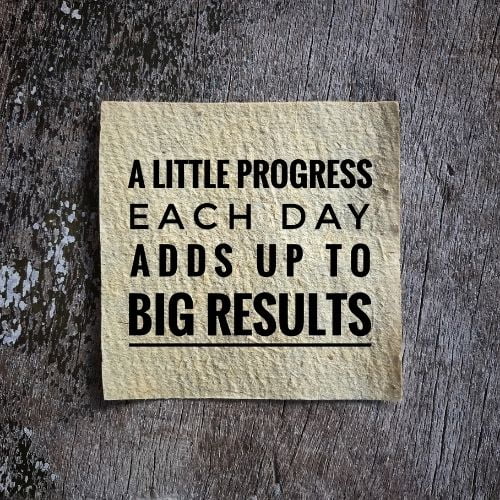
“The greatest legacy one can pass on to one’s children and grandchildren is not money or other material things accumulated in one’s life. But rather a legacy of character and faith.” – Billy Graham
“All good men and women must take responsibility to create legacies that will take the next generation to a level we could only imagine.” – Jim Rohn
“Please think about your legacy because you are writing it every day.” – Gary Vaynerchuk
“Carve your name on hearts, not tombstones. A legacy is etched into the minds of others and the stories they share about you.” – Shannon L. Alder
“Legacy is not leaving something for people. It’s leaving something in people.” – Peter Strople
“If you would not be forgotten as soon as you are dead, either write something worth reading or do something worth writing.” – Benjamin Franklin
“Even though your time on the job is temporary, if you do a good enough job, your work there will last forever.” – Idowu Koyenikan
“The legacy of heroes is the memory of a great name and the inheritance of a great example.” – Benjamin Disraeli
“A friend of mine said something powerful at his grandfather’s funeral. He said that the greatest lesson from his grandfather’s life was that he died empty because he accomplished everything he wanted, with no regrets. I think that, along with leaving a legacy, would be the greatest sign of success.” – Marvin Sapp
Wrapping It Up
We all leave an imprint on our children, our friends, our families, our communities, our jobs, and many other people we cross paths with. It’s up to you to make that legacy a positive one. Follow these tips and look for opportunities to make everyone and everything around you better. This will ensure you will leave a legacy that’s positive and lasting.
Now it’s your turn. What is your legacy going to be?
Did you enjoy this article on how to leave a legacy behind? Don’t forget to share below.


